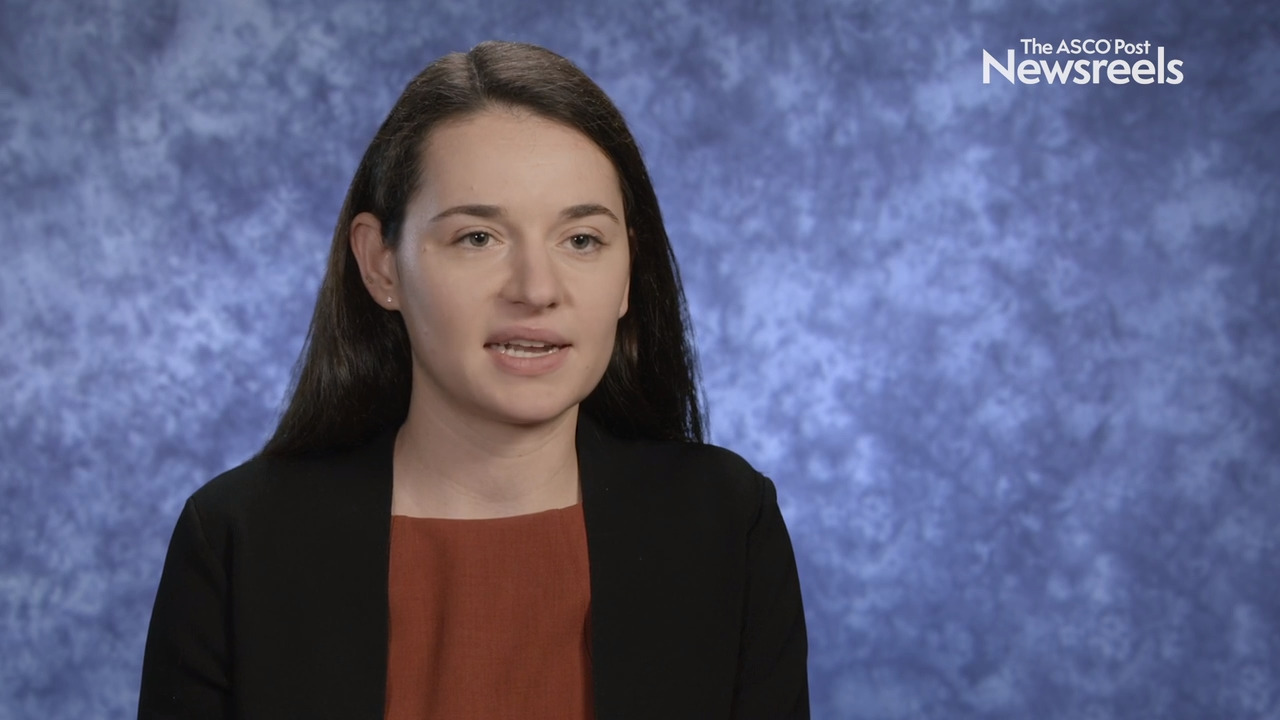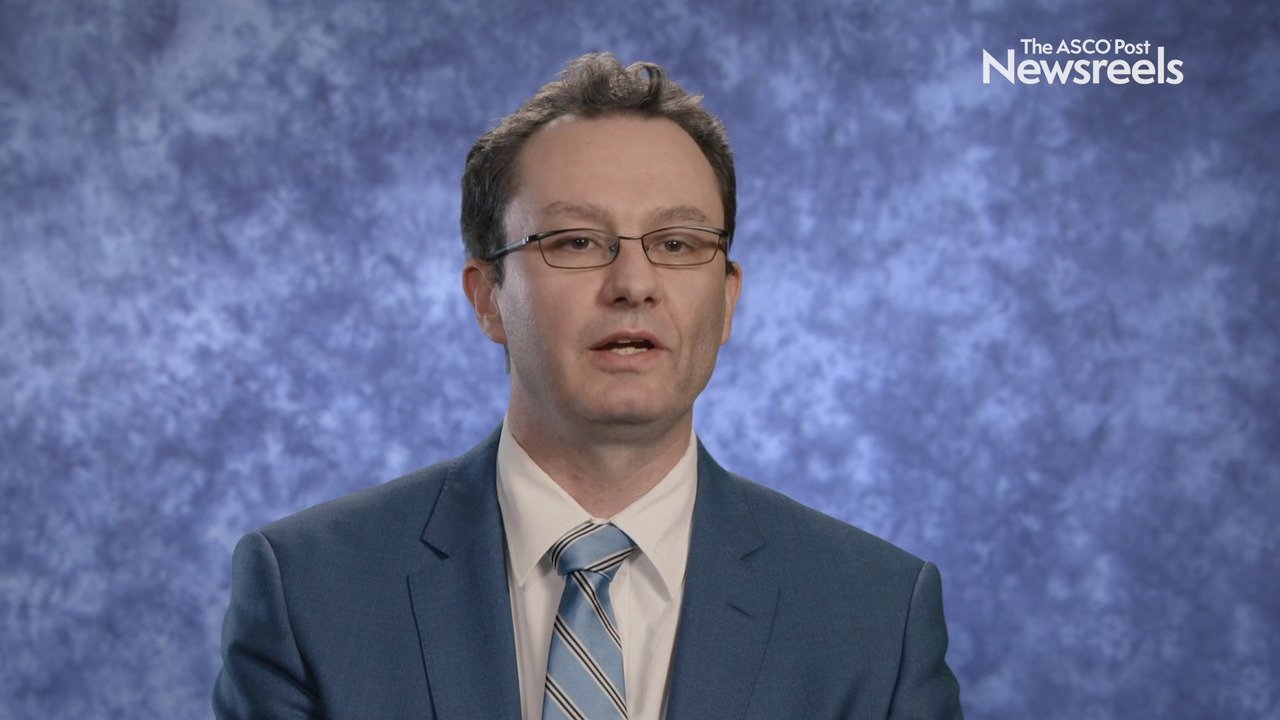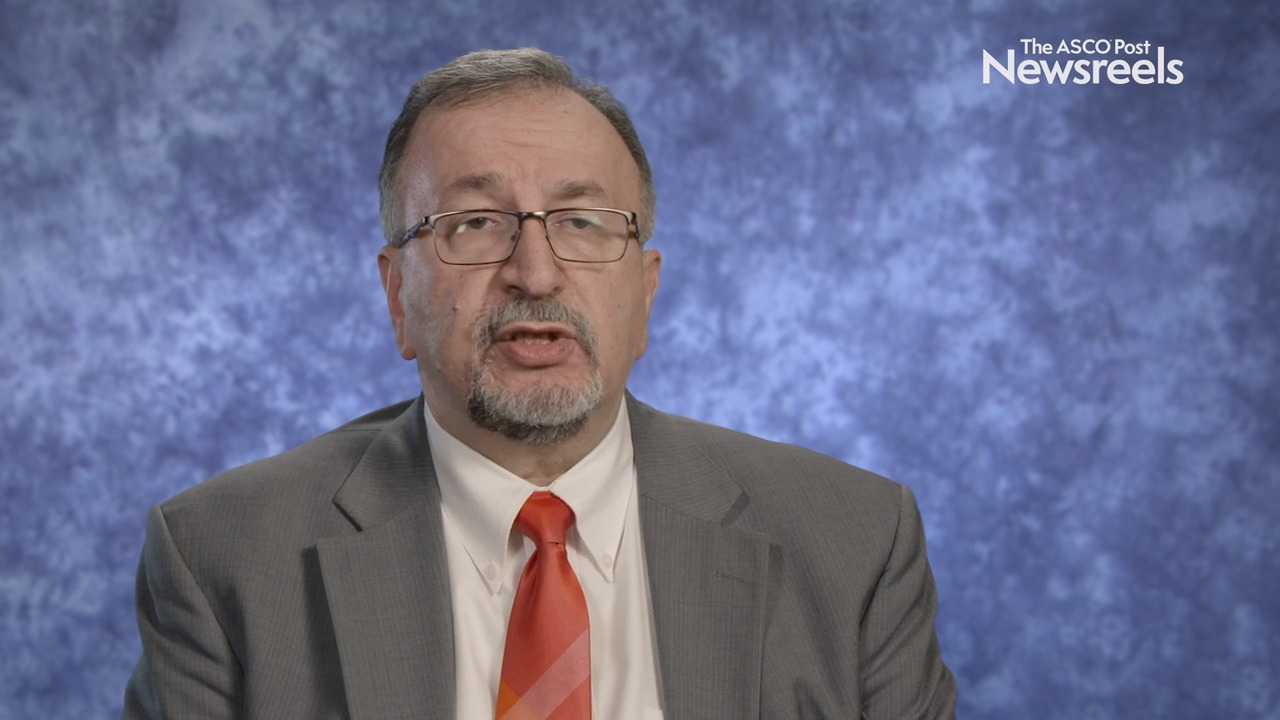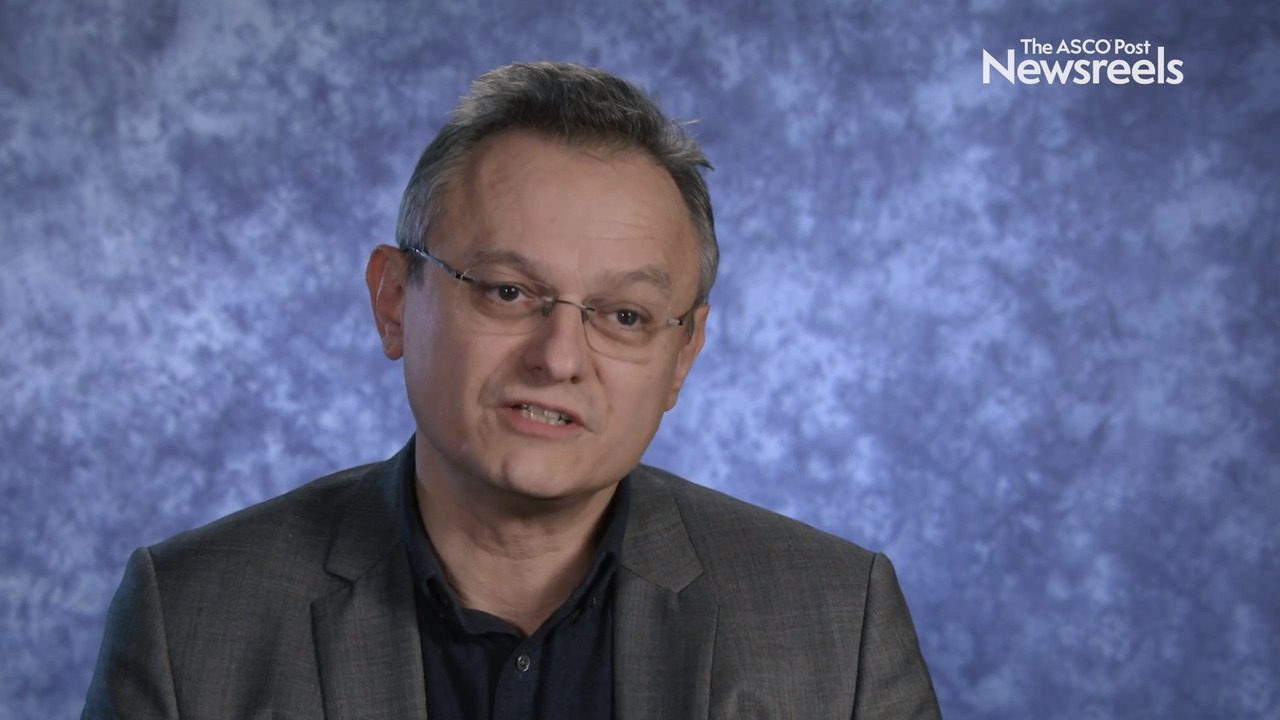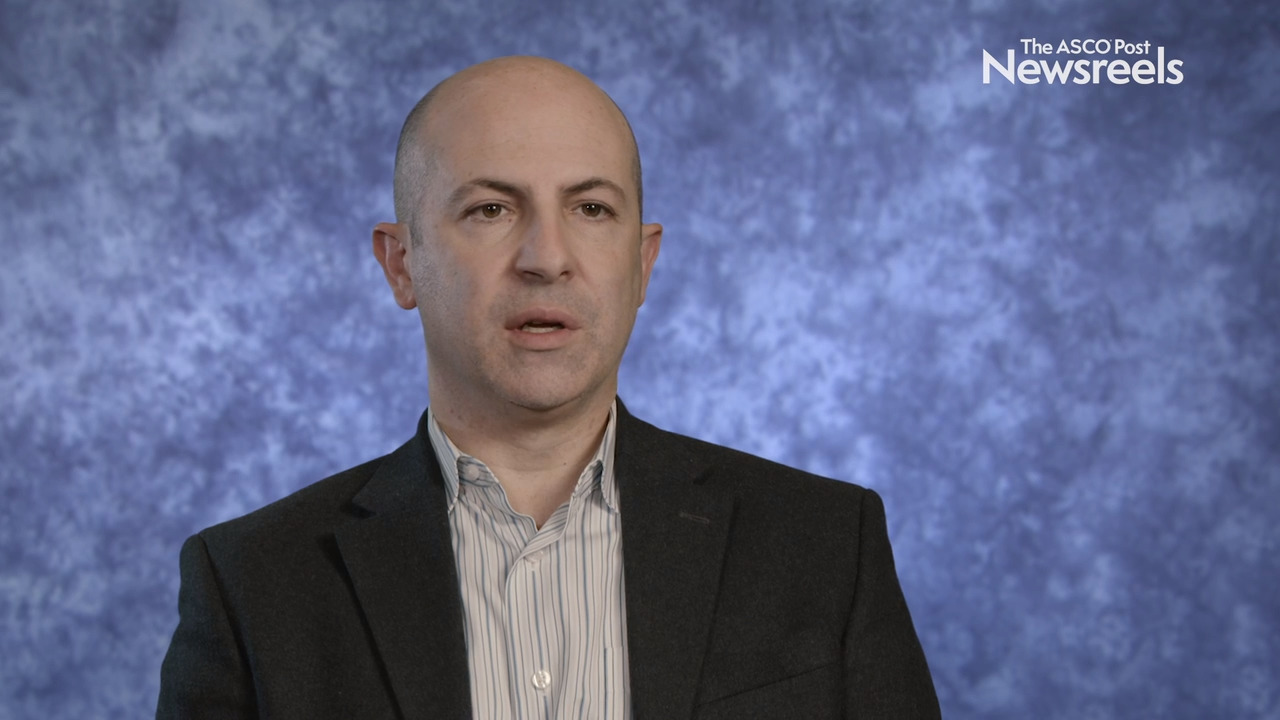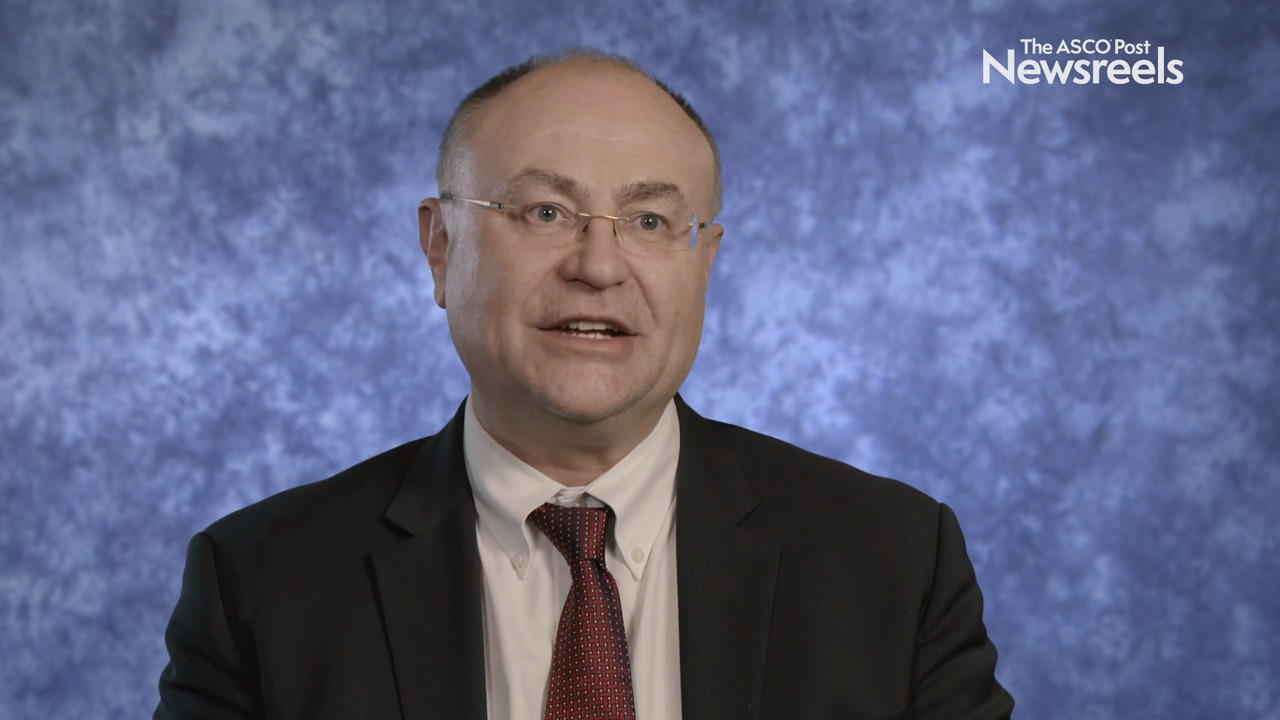2020 Gastrointestinal Cancers Symposium
Expert Point of View: John M. Carethers, MD, and Joseph J. Y. Sung, MD, PhD
Session moderators for the CheckMate 142 presentation at the Gastrointestinal Cancers Symposium were John M. Carethers, MD, the John G Searle Professor (and Chair) of Internal Medicine at the Universi...
CheckMate 142 Updated Analysis: First-Line Nivolumab Plus Low-Dose Ipilimumab in MSI-H/dMMR Metastatic Colorectal Cancer
As a first-line regimen for patients with metastatic colorectal tumors that are microsatellite instability–high (MSI-H) or mismatch repair–deficient (dMMR), the combination of nivolumab and low-dose i...
Expert Point of View: John M. Carethers, MD
The analysis of the National Cancer Database is one of a number of studies describing sociodemographic-related disparities in colorectal cancer outcomes, according to session Co-Chair John M. Carethe...
Studies Aim to Understand Young-Onset Colorectal Cancer
The incidence of colorectal cancer among adults younger than age 50 has risen more than 50% over the past 25 years. Researchers are attempting to understand this phenomenon, as described in several st...
Phase III JAVELIN Gastric 100 Trial Finds No Survival Benefit for Maintenance Avelumab
In the phase III JAVELIN Gastric 100 trial, a strategy called “switch maintenance” with the immune checkpoint inhibitor avelumab after 12 weeks of first-line induction chemotherapy did not statistical...
Expert Point of View: Daniel V.T. Catenacci, MD
The analysis by Chao et al “highlights how well patients with MSI-H tumors do, compared to microsatellite-stable patients, and how much better they do in a randomized setting, being exposed to immunot...
Pembrolizumab in MSI-H and CPS ≥ 10 Advanced Gastric or Gastroesophageal Junction Cancer: Subanalysis of KEYNOTE-059, -061, and -062
The survival benefit of pembrolizumab in advanced gastric/gastroesophageal junction cancer with microsatellite instability–high (MSI-H) tumors or a combined positive score (CPS) ≥ 10 was established i...
Expert Point of View: Richard L. Schilsky, MD, FACP, FSCT, FASCO
Richard L. Schilsky, MD, FACP, FSCT, FASCO, Chief Medical Officer and Executive Vice President of ASCO, called the 74% response rate to cisplatin/gemcitabine “remarkable.” “What’s impressive to me is ...
Cisplatin/Gemcitabine Alone and With Veliparib in BRCA-Mutated Advanced Pancreatic Cancer
In patients with pancreatic ductal adenocarcinoma and a germline BRCA/PALB2 mutation, first-line therapy with cisplatin plus gemcitabine yielded high response rates and encouraging survival, according...
Genetic Counseling and Testing of Patients With Pancreatic Cancer
Routine genetic counseling and multigene testing of patients with pancreatic cancer result in the detection of mutations that are actionable, not only for patients, but also for at-risk family members...
Maintenance Olaparib in BRCA1/2-Positive Pancreatic Cancer Yields Improved Progression-Free Survival, Preserves Quality of Life
Health-related quality of life was preserved during maintenance olaparib in patients with BRCA 1/2-positive pancreatic cancer, as evidenced by a low symptom burden over time.1 POLO investigators repor...
Expert Point of View: Christopher M. Booth, MD
Christopher M. Booth, MD, the invited discussant of the BEACON CRC quality-of-life findings, applauded the investigators for choosing overall survival and quality of life as endpoints in a trial that ...
Mature Follow-up of BEACON CRC Study Reports Quality-of-Life Measures and Survival Outcomes
For patients with previously treated metastatic colorectal cancer harboring BRAF V600E mutations, the phase III BEACON CRC study showed the benefit for combining two or three targeted agents vs the st...
TAPUR Basket Study: Biomarker-Driven Treatment Strategies Yield Benefits in Colorectal Cancer
Positive findings on the potential benefit of molecularly targeted drugs in patients with advanced colorectal cancer were presented at the 2020 Gastrointestinal Cancers Symposium, validating the purpo...
Expert Point of View: A. Craig Lockhart, MD
A. Craig Lockhart, MD, Professor of Medicine, University of Miami Sylvester Comprehensive Cancer Center, applauded the study for making patient-reported outcomes a prespecified endpoint and described...
IMbrave150 Prespecified Analysis Adds Improved Quality-of-Life to Survival Benefits Reaped With Atezolizumab Plus Bevacizumab
New findings from a prespecified analysis of the pivotal IMbrave150 trial revealed improved quality of life for patients with advanced hepatocellular carcinoma treated with atezolizumab plus bevacizum...
Conference Highlights From the 2020 Gastrointestinal Cancers Symposium
This past January, the 2020 Gastrointestinal Cancers Symposium was held in San Francisco. More than 3,600 individuals attended and more than 900 abstracts and posters were presented. Among the highlig...
Selected Abstracts on Novel Treatments in Colon, Hepatocellular, and Biliary Tract Cancers
The ASCO Post has reported on the pivotal trials presented at the 2020 Gastrointestinal Cancers Symposium in several issues. Featured here are the findings of several additional abstracts worthy of me...
Expert Point of View: Daniel V.T. Catenacci, MD
Daniel V.T. Catenacci, MD, of the University of Chicago Medical Center and Biological Sciences, emphasized the value of the patient having microsatellite instability–high (MSI-H) status as a biomarker...
Survival Benefits Achieved With Pembrolizumab in MSI-H and CPS ≥ 10 Gastric/Gastroesophageal Junction Cancer
Post hoc subanalyses of three KEYNOTE trials established the survival benefit of pembrolizumab in advanced gastric/gastroesophageal junction cancer with microsatellite instability–high (MSI-H) tumors ...
Expert Point of View: Richard L. Schilsky, MD, FACP, FSCT, FASCO
Richard L. Schilsky, MD, FACP, FSCT, FASCO, ASCO’s Chief Medical Officer and a gastrointestinal oncologist himself, was pleased to see the TAPUR study bearing fruit among patients with metastatic colo...
ASCO’s TAPUR Study: Biomarker-Driven Treatment Paying Off in Colorectal Cancer
New data presented at the 2020 Gastrointestinal Cancers Symposium are validating the purpose of ASCO’s Targeted Agent and Profiling Utilization Registry (TAPUR) study, a multibasket trial that matches...
Expert Point of View: Daniel V.T. Catenacci, MD
Daniel V.T. Catenacci, MD, Associate Professor of Medicine and Director of the Gastrointestinal Oncology Program at the University of Chicago, was the JAVELIN Gastric 100 study’s invited discussant. A...
No Survival Benefit for Maintenance Avelumab in Advanced Gastric or Gastroesophageal Junction Cancer
In the phase III JAVELIN Gastric 100 trial, a strategy called “switch maintenance” with the immune checkpoint inhibitor avelumab after 12 weeks of first-line induction chemotherapy did not statistical...
New POLO Data Further Support Maintenance Olaparib in BRCA1/2-Positive Pancreatic Cancer
In posters presented at the 2020 Gastrointestinal Cancers Symposium, POLO investigators reported that health-related quality of life was preserved during maintenance olaparib in patients with BRCA 1/2...
Automated Referral Process for Genetic Counseling and Testing of Patients With Pancreatic Cancer
Routine genetic counseling and multigene testing of patients with pancreatic cancer result in the detection of mutations that are actionable, not only for patients, but also for at-risk family members...
Expert Point of View: George A. Fisher, Jr, MD, PhD
George A. Fisher, Jr, MD, PhD, the Colleen Haas Chair in Medicine-Oncology at Stanford University School of Medicine, commented on the cell-free DNA methylation blood-based test from the Circulating ...
Use of Cell-Free DNA Methylation–Based Blood Test in Detecting Gastrointestinal Cancers
A noninvasive, blood-based, cell-free DNA test focused on the presence of DNA methylation appears to be highly sensitive in detecting gastrointestinal cancers and may pinpoint the tissue of origin in ...
Expert Point of View: A. Craig Lockhart, MD
The invited discussant of the IMbrave150 trial, A. Craig Lockhart, MD, Professor of Medicine, University of Miami Sylvester Comprehensive Cancer Center, applauded the study for making patient-reporte...
Patient-Reported Outcomes From IMbrave150: Better Quality of Life With Doublet
For the first-line treatment of advanced hepatocellular carcinoma, atezolizumab plus bevacizumab provided a significant overall survival benefit in the pivotal IMbrave150 trial. New findings from a pr...
Data From Colorectal Cancer Cohorts of TAPUR Study Presented
Positive findings from three Targeted Agent and Profiling Utilization Registry (TAPUR) study cohorts on the potential benefit of molecularly targeted drugs in patients with advanced colorectal cancer ...
BEACON-CRC: Quality of Life May Be Well Maintained With Targeted Treatment
For patients with previously treated metastatic colorectal cancer harboring BRAF V600E mutations, the phase III BEACON-CRC study showed the benefit for combining two or three targeted agents vs the s...
Expert Point of View: Andrea Wang-Gillam, MD, PhD
Andrea Wang-Gillam, MD, PhD, Clinical Director of the GI Oncology Program and Director of Developmental Therapeutics at Washington University in St. Louis, was the invited discussant of SEQUOIA and HA...
Two Novel Pegylated Agents Fail in Metastatic Pancreatic Cancer
Two novel treatments once thought to hold promise in the treatment of metastatic pancreatic cancer have not proved to be effective in phase III trials, investigators reported at the 2020 Gastrointesti...
Expert Point of View: Marcia Cruz-Correa, MD, PhD
Marcia Cruz-Correa, MD, PhD, Professor of Medicine at the University of Puerto Rico and Adjunct Professor of Surgical Oncology at The University of Texas MD Anderson Cancer Center, congratulated the ...
PANGEA Trial Shows Personalized Antibody Selection May Improve Outcomes in Gastroesophageal Cancer
A personalized approach to selecting antibody therapy for patients with newly diagnosed stage IV gastroesophageal adenocarcinoma resulted in a 1-year overall survival rate of 66% and a median overall ...
Thomas Yau, MBBS, on Advanced Hepatocellular Carcinoma: CheckMate 040 Trial of Nivolumab, Ipilimumab, and Cabozantinib
Thomas Yau, MBBS, of the University of Hong Kong, discusses this triplet combination, which yielded better responses than doublet combination therapy in patients with advanced liver cancer, but with m...
Brian M. Wolpin, MD, on Performance of a Blood-Based Test for the Detection of Multiple Cancers
Brian M. Wolpin, MD, of Dana-Farber Cancer Institute, discusses a noninvasive blood test evaluating methylation of circulating free DNA. In his study, the blood test detected multiple gastrointestinal...
Danielle S. Bitterman, MD, on Pancreatic Cancer: Noninvasive Genomic Profiling From Plasma ctDNA
Danielle S. Bitterman, MD, of the Harvard University Radiation Oncology Program and Massachusetts General Hospital, discusses an analysis of genomic and clinical data from 97 patients with pancreatic ...
Thibaud Kössler, MD, PhD, on Localized Rectal Cancer: Neoadjuvant Pembrolizumab and Radiotherapy
Thibaud Kössler, MD, PhD, of Geneva University Hospital, discusses the first trial to study the efficacy and safety of anti–PD-1 immunotherapy plus short-course radiotherapy in localized microsatellit...
Eyal Meiri, MD, on Pembrolizumab in Colorectal Cancer: Results From the TAPUR Study
Eyal Meiri, MD, of the Cancer Treatment Centers of America at Southeastern Regional Medical Center, discusses his findings on heavily pretreated patients with colorectal cancer with high tumor mutatio...
Franck Pagès, MD, PhD, on Stage III Colon Cancer: IDEA Study on a Risk Assessment Tool
Franck Pagès, MD, PhD, of the Hôpital Européen Georges Pompidou, discusses study findings from the prospective IDEA France cohort study of patients with stage III colon cancer treated with mFOLFOX6. T...
Van K. Morris, MD, on Stage II Colon Cancer: Circulating Tumor DNA as a Predictive Biomarker in Adjuvant Chemotherapy
Van K. Morris, MD, of The University of Texas MD Anderson Cancer Center, discusses the COBRA study, which is examining circulating tumor DNA and its ability to predict whether patients with resected s...
Peter R. Galle, MD, on Atezolizumab/Bevacizumab vs Sorafenib for Hepatocellular Carcinoma: Patient-Reported Outcomes
Peter R. Galle, MD, of the University Medical Center, Mainz, discusses patient-reported outcomes from this phase III study, which showed the combination of atezolizumab plus bevacizumab vs sorafenib i...
Zev A. Wainberg, MD, on PD-L1–Positive Advanced Gastric Cancer: MSI and Combined Positive Score and Pembrolizumab vs Chemotherapy
Zev A. Wainberg, MD, of the UCLA Medical Center, discusses the first subset analysis of how a combined positive score in gastric and gastroesophageal junction cancers related to the efficacy of pembro...
Heinz-Josef Lenz, MD, on Metastatic Colorectal Cancer: Nivolumab Plus Low-Dose Ipilimumab as First-Line Therapy
Heinz-Josef Lenz, MD, of USC Norris Comprehensive Cancer Center, discusses how treating microsatellite instability–high/DNA mismatch repair–deficient metastatic colorectal cancer with nivolumab once e...
Expert Point of View: Richard L. Schilsky, MD, FACP, FSCT, FASCO
Richard L. Schilsky, MD, FACP, FSCT, FASCO, Chief Medical Officer and Executive Vice President of ASCO, who is also a gastrointestinal oncologist, called the 74% response rate to cisplatin/gemcitabin...
‘Unprecedented’ Responses to Cisplatin/Gemcitabine in BRCA-Mutated Advanced Pancreatic Cancer
As first-line treatment of patients with pancreatic ductal adenocarcinoma and a germline BRCA/PALB2 mutation, cisplatin plus gemcitabine yielded high response rates and encouraging survival, establish...
Scott Kopetz, MD, PhD, on Metastatic Colorectal Cancer: Quality of Life Results on Encorafenib, Cetuximab, and Binimetinib
Scott Kopetz, MD, PhD, of The University of Texas MD Anderson Cancer Center, discusses phase III findings from the BEACON CRC trial, which had demonstrated that the triplet regimen of encorafenib, cet...
Eileen M. O’Reilly, MD, on Pancreatic Adenocarcinoma: Gemcitabine, Cisplatin, and Veliparib
Eileen M. O’Reilly, MD, of Memorial Sloan Kettering Cancer Center, discusses phase II trial findings showing that cisplatin and gemcitabine, with or without veliparib, exceeded a prespecified response...


